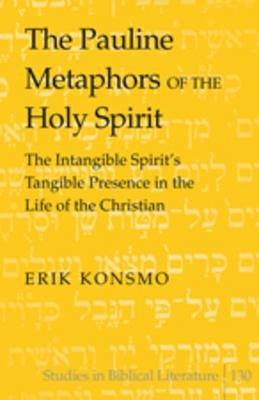
- We will send in 10–14 business days.
- Author: Erik Konsmo
- Publisher: Peter Lang Us
- ISBN-10: 1433106914
- ISBN-13: 9781433106910
- Format: 15.6 x 23.4 x 1.4 cm, kieti viršeliai
- Language: English
- SAVE -10% with code: EXTRA
The Pauline Metaphors of the Holy Spirit; The Intangible Spirit's Tangible Presence in the Life of the Christian (e-book) (used book) | bookbook.eu
Reviews
Description
In the Pauline literature of the New Testament, the characteristics of the Spirit and Christian life are described through the use of metaphor. An interpreter of Paul must understand his metaphors in order to arrive at a complete understanding of the Pauline pneumatological perspective. Thus, The Pauline Metaphors of the Holy Spirit examines how the Pauline Spirit metaphors express the intangible Spirit's tangible presence in the life of the Christian. Rhetoricians prior to and contemporary with Paul discussed the appropriate usage of metaphor. Aristotle's thoughts provided the foundation from which these rhetoricians framed their arguments. In this context, The Pauline Metaphors surveys the use of metaphor in the Greco-Roman world during the NT period and also studies modern approaches to metaphor. The modern linguistic theories of substitution, comparison, and verbal opposition are offered as representative examples, as well as the conceptual theories of interaction, cognitive-linguistic, and the approach of Zoltán Kövecses. In examining these metaphors, it is important to understand their systematic and coherent attributes. These can be divided into structural, orientational, and ontological characteristics, which are rooted in the conceptual approach of metaphor asserted by George Lakoff and Mark Johnson. This book evaluates these characteristics against each of the Pauline Spirit-metaphors.
EXTRA 10 % discount with code: EXTRA
The promotion ends in 22d.14:25:03
The discount code is valid when purchasing from 10 €. Discounts do not stack.
- Author: Erik Konsmo
- Publisher: Peter Lang Us
- ISBN-10: 1433106914
- ISBN-13: 9781433106910
- Format: 15.6 x 23.4 x 1.4 cm, kieti viršeliai
- Language: English English
In the Pauline literature of the New Testament, the characteristics of the Spirit and Christian life are described through the use of metaphor. An interpreter of Paul must understand his metaphors in order to arrive at a complete understanding of the Pauline pneumatological perspective. Thus, The Pauline Metaphors of the Holy Spirit examines how the Pauline Spirit metaphors express the intangible Spirit's tangible presence in the life of the Christian. Rhetoricians prior to and contemporary with Paul discussed the appropriate usage of metaphor. Aristotle's thoughts provided the foundation from which these rhetoricians framed their arguments. In this context, The Pauline Metaphors surveys the use of metaphor in the Greco-Roman world during the NT period and also studies modern approaches to metaphor. The modern linguistic theories of substitution, comparison, and verbal opposition are offered as representative examples, as well as the conceptual theories of interaction, cognitive-linguistic, and the approach of Zoltán Kövecses. In examining these metaphors, it is important to understand their systematic and coherent attributes. These can be divided into structural, orientational, and ontological characteristics, which are rooted in the conceptual approach of metaphor asserted by George Lakoff and Mark Johnson. This book evaluates these characteristics against each of the Pauline Spirit-metaphors.


Reviews